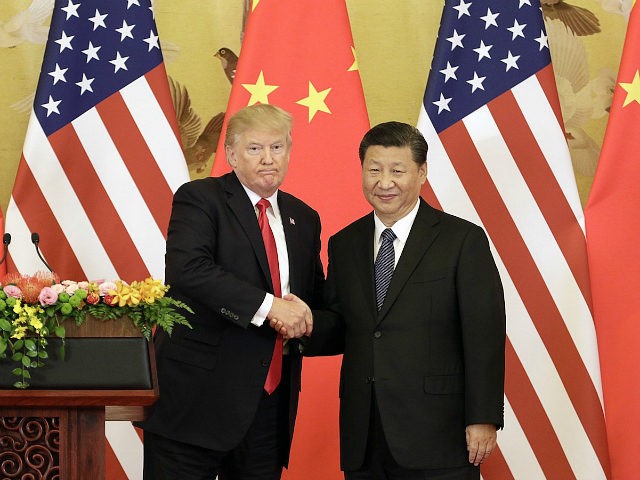The Chinese state propaganda outlet Global Times argued in a column Wednesday that the “Divided States of America” faces a growing identity crisis before the “increasingly confident Chinese people,” failing to note growing separatist movements and political dissidents within its own borders.
The Times argues that alleged chaos in the United States is making it increasingly difficult for other countries to know how to conduct relations with the United States, while China’s authoritarian communist regime offers predictability.
“The US we are now interacting with is a ‘Divided States of America,'” the piece claims. “Those who support Trump and those against him are deeply divided. Not only China, but other countries have also felt it is difficult to deal with the US.”
In contrast, it argues, “the US faces an increasingly confident Chinese people, something it is uncomfortable and unfamiliar with.” It also faces pressure to resolve problems regarding “North Korea, India, Japan, Vietnam, and Australia,” the column claims, which distract from the bilateral relationship.
China’s support for North Korea and violations of the sovereignty of the other countries mentioned have led to vocal protests from the White House and administration generally, as they serve to destabilize the world. The Global Times insists, however, that China is the source of the world’s stability while Washington inspires discord.
The piece takes a surprisingly favorable attitude towards President Donald Trump despite its assessment that America is essentially doomed to failure for allowed freedom of expression against those in power. It qualifies American-Chinese relations in 2017 as “better than expected” largely due to Trump reaching out regularly to communist strongman Xi Jinping. It notes that China is allegedly less concerned than it used to be about its rival because “U.S. military might has decreased” and “the U.S. finds economic sanctions to be less effective in ensuring compliance.”
The piece is far from the first time the Chinese government uses its propaganda arms to further the image of the United States as a rogue actor on the world stage constantly on the verge of internal collapse. A year ago, amid protests against President Trump’s inauguration, the Global Times claimed the U.S. government allowing protests at all had exposed “the fragility of Western democracy” to the world.
“From the protests against Trump, Chinese people found the schism in the US is becoming increasingly serious and are questioning the reliability and universality of the Western democratic system,” the newspaper argued at the time. China does not face these “schisms” because the people have no right to demand any government other than the repressive Communist Party, the Global Times suggested.
Xinhua, typically the more subdued state media outlet in China, made similar arguments in an article published in October, as enthusiasm over the Communist Party Congress that month among Party members peaked.
“Unlike competitive, confrontational Western politics, the CPC and non-Communist parties cooperate with each other, working together for the advancement of socialism and striving to improve the people’s standard of living,” the Xinhua column alleged. “The relationship maintains political stability and social harmony and ensures efficient policy-making and implementation.”
What these arguments ignore is that the China of today is the most divided it has been since the rise of communism under Mao Zedong. China currently faces three major separatist movements – four if counting Taiwan as a separatist region and not sovereign state. Hong Kong, Tibet, and Xinjiang have experienced growing protests against repression from far-off, communist Beijing. In response, Chinese officials are trying to micromanage Hong Kong’s elections, attempting to install a pro-Communist Dalai Lama, and forcing Xinjiang residents to install GPS trackers on their cars.
The sovereign people of Taiwan also took an aggressive step away from Beijing last year by electing Tsai Ing-wen their president. The Chinese government has responded by attempting a takeover of Taiwanese flight paths, threatening to invade Taiwan if it continues to pursue closer ties to the United States and funding rap videos calling Tsai a “bitch.”
China’s communists also face a much more geographically pervasive threat to the “harmony” of their totalitarianism: Christianity. China boasted an estimated 100 million Christians in 2014 – 60 million more than the Chinese government claimed, due to the growing unpopularity of state-run churches, and 20 million more than the number of registered members of the Communist Party. Studies suggest that China will have the largest Christian population in the world by 2030. Christmas celebrations are more popular than ever, triggering a nationwide campaign by the Communist Youth League against the holiday.
The Communist Party has responded to the exponential growth in Christianity, inherently an individualist religion, with panic. Beijing has branded Christianity – among other religions, particularly Buddhism in Tibet and Islam in Xinjiang – a danger to “national security and public health.” The Communist Party Congress featured multiple high-profile calls to “Sinicize” all religion, especially Christianity, to prevent any faith from “endangering national unity” behind communism. In the nation’s rural corners, government officials began going door-to-door in November forcing peasants to replace photos of Jesus with images of Xi Jinping.
While Xi has presented a thorough, comprehensive plan for crushing these divides in Chinese society, they nonetheless exist and present an image of a nation apparently united only in its rejection of his leadership. The state of China today appears to contradict the repeated claims in Chinese state media that the fall of the “Divided States of America,” and not Communist China, is imminent.

COMMENTS
Please let us know if you're having issues with commenting.